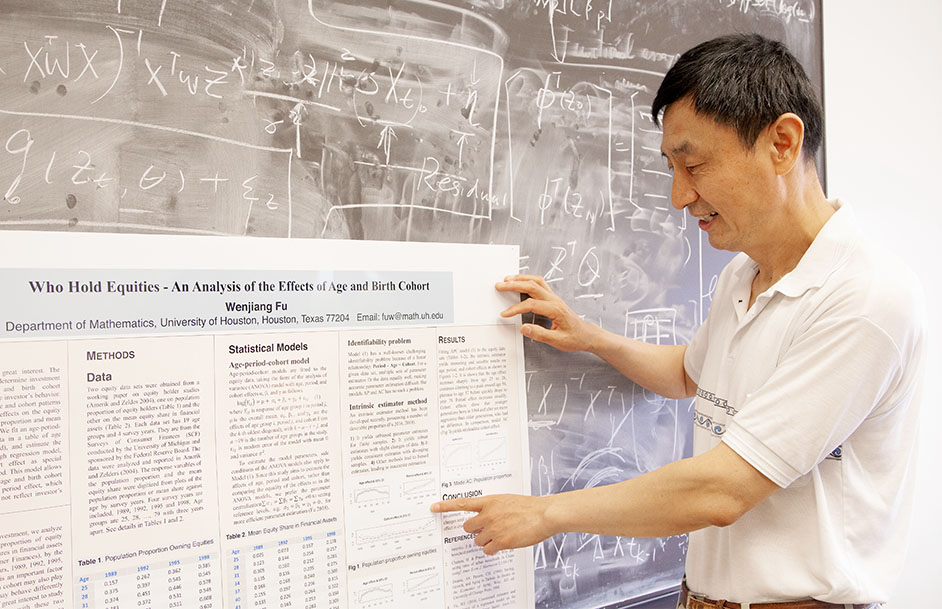Fu to Analyze Consumer Spending, Workers Compensation and Labor Cost Data
The United States Bureau of Labor Statistics awarded University of Houston Department of Mathematics professor, Wenjiang Fu, a Senior Research Fellowship. The year-long opportunity means Fu will work with bureau staff to analyze data from complex issues relevant to their programs.

“It is an honor to receive this prestigious fellowship," Fu said, “not only to learn from staff, but to help them disentangle their data. This will help the country establish policies, so we can grow the economy, without high inflation. The work will have a major impact not only on the government but on every single individual’s life.”
Fu, a faculty member at the UH College of Natural Sciences and Mathematics, began his fellowship July 1. He works with U.S. Bureau of Labor Statistics’ (BLS) Consumer Expenditure Survey, National Compensation Survey and Employment Cost Index data.
The Consumer Expenditure Survey provides data on expenditures, income and demographics of U.S. consumers. The National Compensation Survey provides measures of wages, salaries and benefits, along with compensation trends. The Employment Cost Index, according to the BLS, is “a quarterly measure of the change in the price of labor, defined as compensation per employee hour worked.”

The goal of his research with the BLS is to help improve the modeling and efficiency in estimating and monitoring economic growth.
A Key Model
Fu will use the age-period-cohort model to work with BLS data.
“The age-period-cohort model has been in use by quantitative scientists since the 1950s,” he said. “It is the major model I’ve been working on the last 20 to 30 years.”
The model works by decomposing a given data set about human activities or behavior into age, calendar year and generation. From there, statisticians observe different trends in age, calendar year and birth cohort.
However, researchers in the past have struggled with the model, because multiple mathematical solutions lead to different trends for a given data set, making it extremely difficult to provide accurate trend estimation.
“Many people studied this model but eventually gave up. They said there is no way to know which solution is correct, because the data does not provide such information,” Fu said.
Fu finally developed a solution that worked best and made the most sense, but the statistics community did not believe it. It took him 20 years to finally get his work widely accepted.
In 2016, he published his findings in the Journal of the American Statistical Association, a top journal. In 2018, he published a book about the same work. “I gave readers programming to compute the right solution for the age-period-cohort model. I work with HIV AIDS, lung cancer mortality and retirement savings data in the book. I wanted to show the wide applications of the model.”
Variety of Impacts from BLS Research
At the BLS, Fu will use their data to facilitate modeling and understanding of consumer expenditure patterns and labor cost.
Specifically, he will apply statistical models and methods to analyze survey data to accurately estimate temporal trends of consumer expenditures, correct bias and analyze individual labor cost. He will also study the impact of shocks, like the 2008 recession and COVID-19 pandemic, on consumer expenditures and employment costs through statistical modeling, hypothesis testing and forecasts.
The research outcomes could have an impact on government policymaking on poverty, education, health and life expectancy. The work could also affect economic activities like savings and investments.
Fu is on a year-long sabbatical from teaching and his role as director of the UH Master of Science in Statistics and Data Science program. His research fellowship ends March 31, 2023.
An indirect benefit from his fellowship is the opportunity to form collaborations with bureau staff and researchers. The connections could help his students find internships or begin careers with the BLS.
- Rebeca Trejo, College of Natural Sciences and Mathematics